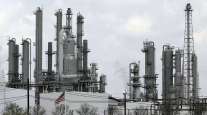Diesel Jumps 11.4¢ to $2.79 a Gallon
By Frederick Kiel, Staff Reporter
This story appears in the April 9 print edition of Transport Topics.
The average retail price of diesel fuel jumped 11.4 cents to $2.79 a gallon, the largest one-week jump in 18 months, pushed up by the recent surge in crude oil prices, the Department of Energy reported.
DOE also said the average retail gasoline price increased 9.7 cents to $2.707 a gallon, as crude oil prices on the New York Mercantile Exchange topped $66 a barrel last week, before Iran’s decision to release 15 captured British military personnel. The release eased political tensions and concerns about a supply shortage.
Oil then fell to about $64 a barrel late last week, but that price still was about $8 a barrel higher than it had been on March 19.
“Both diesel and gasoline retail prices have shown significant increases for the same basic reasons,” Joann Shore, an analyst with DOE’s Energy Information Administration, told Transport Topics last week. “Crude prices have risen nearly $10 a barrel over the past two weeks because of the geopolitical situation, with Iran holding British military personnel.”
Diesel’s increase, which followed a combined 0.9-cent decline over the prior two weeks, left the average price at its highest level since Sept. 11, and 17.3 cents above the comparable week a year ago.
The price rise was the largest one-week gain since supply problems caused by Gulf Coast hurricanes sent the average up 34.6 cents on Oct. 3, 2005.
The jump last week also was the ninth straight increase in the gasoline average, totaling 54.2 cents. Gas now is 11.9 cents higher than the corresponding week last year.
American Trucking Associations estimates that U.S. truckers consume 730 million gallons of diesel fuel a week and 280 million gallons of gasoline, translating into an additional $83 million in expense for fleets to buy their diesel last week, and $27 million more for gasoline.
“We’ve been eating the [diesel] price increases,” Gerald Everett, secretary-treasurer of Everetts Inc. of Abilene, Kan., told TT.
“We’re in the dump-truck business, and you have to bid on contracts 8-to-10 months ahead of time,” said Everett, whose company has 18 trucks and 19 tractors, all for local use. “We try to factor diesel price rises into our bids, but it always goes up more than we thought. Basically, we’re barely breaking even now.”
Charles Robert, president of the four-truck Coastal Plains Farmers Coop Inc. in Quitman, Ga., also was upset.
“Prices have gotten so high, it doesn’t even pay us to run the trucks,” Robert told TT.
Robert said that although the local diesel distribution company gave some fuel surcharge credits, “It doesn’t help our company much because it’s so small.”
Coastal Plains runs dry goods and produce cooled with ice in the Southeast.
EIA’s Shore also said that some of the fuel price increases resulted from recent breakdowns in refineries serving the Midwest and Colorado.
“Some independent diesel and gasoline wholesalers were turned away from refineries in those regions because the plants had run out of product, and some national chains could not get their full scheduled deliveries,” Shore said. “They had to scramble to find other suppliers, who were able to charge higher prices because of the general shortage.”
Each week, DOE surveys 350 diesel filling stations to compile the national average price.




